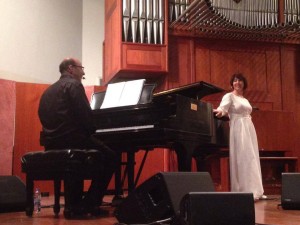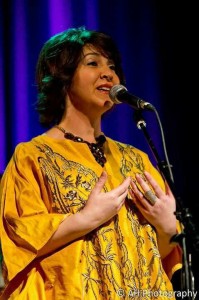Als Oumeima El Khalil die Bühne betritt, ist sofort ein vertrautes Gefühl da. Es ist, als ob sich zwei gute alte Freunde treffen – das Publikum und die Sängerin. Oumeima El Khalil steht dort, wo früher der Altar gewesen sein muss. Denn die Assembly Hall der American University Beirut war vor langer Zeit einmal eine Kirche, auch die Bänke sind noch so wie damals. Oumeima trägt ein schlichtes langes weißes Kleid. Ein bisschen erinnert sie mich an Fairuz, die Grande Dame der libanesischen Musik.
Oumeimas Stimme berührt alle im Publikum
Bereits beim ersten Lied singt das Publikum mit. Oumeimas Stimme ist hell und leicht, sie schwebt durch den Raum. Ihr Mann begleitet sie am Flügel. Vier weitere Musiker spielen arabische Laute, Bass, Percussions und Kanun, die orientalische Zither, die es seit dem zehnten Jahrhundert gibt. Ihren bekanntesten Song „Asfour“ – auf Deutsch „Vögel“ – singt Oumeima a cappella. Das Publikum lauscht gebannt. Einem Mann zwei Reihen hinter mir laufen die Tränen über die Wangen.
Am Tag zuvor: Ich besuche Oumeima zu Hause. Als sie die Tür aufmacht, kommt mir ihr weißer Hund entgegen. Seine Pfoten kratzen auf dem dunklen Parkett. Im Wohnzimmer stehen eingerahmte Fotos von ihrem Mann und ihrem Sohn auf der Anrichte. Oumeima sitzt neben mir im Sessel. Ihr Haarschnitt ist modern und ungewöhnlich: Auf der einen Seite sind die Haare kürzer als auf der anderen. Dort schaut ein großer, silberner Ohrring hervor.
Oumeima singt und musiziert seit ihrer Kindheit. Ihr Vater, ein Französischlehrer, habe sie gezielt gefördert, sagt sie. „Als ich richtig sprechen konnte, hat er gemerkt, dass ich eine schöne Stimme habe, und er hat mich darin bestärkt zu singen.“ Leicht war das nicht, denn damals tobte der Bürgerkrieg in Libanon. Oumeima und ihre Familie wohnten in einem Dorf weit entfernt von professionellem Musikunterricht. Doch auch in der Hauptstadt Beirut war das Musikkonservatorium zeitweise geschlossen. Dennoch schaffte es ihr Vater, dass sie eine professionelle Musikausbildung erhielt. Als Oumeima zwölf Jahre alt war, wurde sie vom libanesischen Sänger und Komponisten Marcel Khalife entdeckt. Für Oumeima war das der Beginn ihrer Karriere. „Die Leute haben mich und meine Stimme durch Lieder kennen gelernt, die für mich geschrieben waren“, sagt sie. Noch heute singt sie viele Lieder, die Marcel Khalife für sie komponiert. Das letzte Lied auf dem Konzert einen Tag später wird sie wie immer ihm widmen.
https://www.youtube.com/watch?v=_czxv_P9UzU&list=PLwpYwXLx8mgunvnkGSUl-kvLOF53v2DUH
Oumeimas Musik ist eine Mischung aus vielen Stilen, von Volkstümlichem über Jazz und Blues bis Funk, und immer ist eine arabische Note dabei. Ihr Song „Mazaj“ läuft als Remix in Clubs in London. „Ich liebe es zu tanzen, und ich freue mich, wenn meine Arbeit dort ankommt“, sagt Oumeima, „aber das ist nicht das einzige, für das ich arbeite.“ Mit ihren Song will sie zum Nachdenken anregen. „Es ist die Aufgabe der Kunst, über die Menschen zu sprechen, und zwar nicht erst dann, wenn etwas passiert ist“, antwortet sie, als ich sie auf die Revolutionen und die Veränderungen in der arabischen Welt anspreche. „Kunst sollte die Ereignisse vorhersehen und das Geschehen begleiten, auch darüber hinaus.“ Allerdings finde solche Kunst nur noch wenig Gehör. „In Libanon gibt es Freiheit. Jeder kann sagen, was er will. Aber er bekommt keine Antworten, und es gibt niemanden, der das wertschätzt“, sagt sie. Jeder höre nur noch auf den Anführer seiner Gruppe. Mit Gruppe meint sie die ethnische oder religiöse Zugehörigkeit. In Libanon gibt es 18 verschiedene Gruppen. Zu welcher Oumeima gehört, will sie nicht sagen. Für sie spiele das heute mit 44 Jahren genauso wenig eine Rolle wie zu ihrer Kindheit. „Erst als wir größer wurden, haben wir gelernt, dass der eine zu dieser Religion gehört und der andere zu einer anderen. Das war während des Kriegs, als wir auf einmal getrennt wurden.“ Für ihre Heimat Libanon wünscht sich Oumeima, dass alle Menschen gemeinsam friedlich leben. Musik könne ihren Beitrag leisten, indem sie die Menschen verbinde – über alle Grenzen hinweg.
Links:
https://www.facebook.com/Oumeimaelkhalil
http://oumeima.com/
Oumeima El Khalil: Discovered When She Was Twelve
From the first moment Oumeima El Khalil enters the stage a familiar friendship fills the room between the audience and the singer. Oumeima El Khalil stands where I suppose once the altar was. The Assembly Hall of the American University Beirut used to be a church, even the pews are still in their place. Oumeima wears a plain long white dress. Somehow she reminds me of Fairuz, the Grande Dame of Lebanese music.
Already from the first song the audience starts to sing along. Omeima’s voice is bright and light, it is floating the room. Her husband accompanies her on the grand piano. Four other musician play the Arabic lute, bass, percussions and Qanun, the oriental zither, an instrument going back to the 10th century. One of her most famous songs “Asfour”, which means “birds”, Oumeima sings a cappella. The audience is listening to it spellbound. Tears are running down the cheeks of a man sitting behind me.
A day before: I visit Oumeima at her house. When she opens the door her white dog comes towards me, scratching with his paws on the dark parquet-floor. On the sideboard in the living-room I see pictures of her husband and her son. Oumeima sits next to me in an armchair. She has a modern and unusual haircut: on one side it is shorter than on the other and there peers a big silver earring.
Since her early childhood Oumeima plays music and sings. Her father, a teacher for French, supported her in every step, Oumeima says. “The moment I spoke fluently, he noticed that I have a beautiful voice and he encouraged me to sing.” This wasn’t easy at all, since the civil war blustered Lebanon at that time. Oumeima and her family lived in a village far away from professional music instruction. But also in Beirut the music conservatory was closed down several times. Somehow her father managed that she was able to receive a professional music education. When Omeima was twelve years old, the Lebanese singer and composer Marcel Khalife discovered her talent. For Oumeima this happened to be the start of her career. “People immediately got to know me and my voice through songs that had been written for me”, she says. Until today she sings lots of songs composed by Marcel Khalife. At the concert the following day she will dedicate her last song to him, as always.
Oumeimas music is a mix of many different stiles – from folklore to jazz and blues to funk and always there is an Arabic tune to it. A remix of her song “Mazaj” is played in clubs in London. “I love to dance and I am happy when people like my work”, Oumeima says, “but that is not my only ambition.” With her songs she wants people to start to reflect. “It is the aim of art to talk about people not only when something has happened”, Oumeima says when I ask her about the revolutions and the latest developments in the Arab world. “Art has to foresee the events, it has to go along with them and follow them up.” Though such art hardly reaches anybody, Oumeima is convinced. “In Lebanon is freedom of speech. Everybody can say what he wants but he won’t get answers and nobody will appreciate it.“ People would only listen to the leaders of their group. By group Oumeima refers to the 18 different ethnic and religious groups in Lebanon. To which she belongs she doesn’t want to say. It doesn’t play a role at all neither today as she is in her forties nor in her childhood, Oumeima says. “Only growing up we learned who belongs to which religion. That was during the civil war when we got separated.” For her country Lebanon Oumeima hopes that all people will soon live together peacefully. Music can contribute to this by getting people together regardless which group they belong to.

